鲁教版八年级英语下Unit 4 How can we become good learners? Section B(Period Three) 课件(共23张PPT)
文档属性
| 名称 | 鲁教版八年级英语下Unit 4 How can we become good learners? Section B(Period Three) 课件(共23张PPT) | 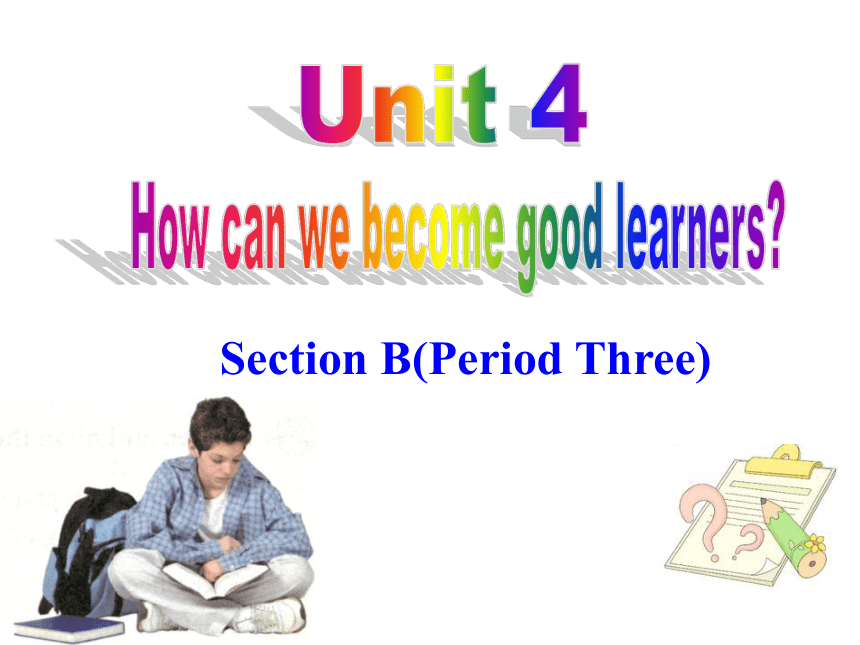 | |
| 格式 | zip | ||
| 文件大小 | 1.2MB | ||
| 资源类型 | 教案 | ||
| 版本资源 | 鲁教版 | ||
| 科目 | 英语 | ||
| 更新时间 | 2020-05-07 20:08:27 | ||
图片预览


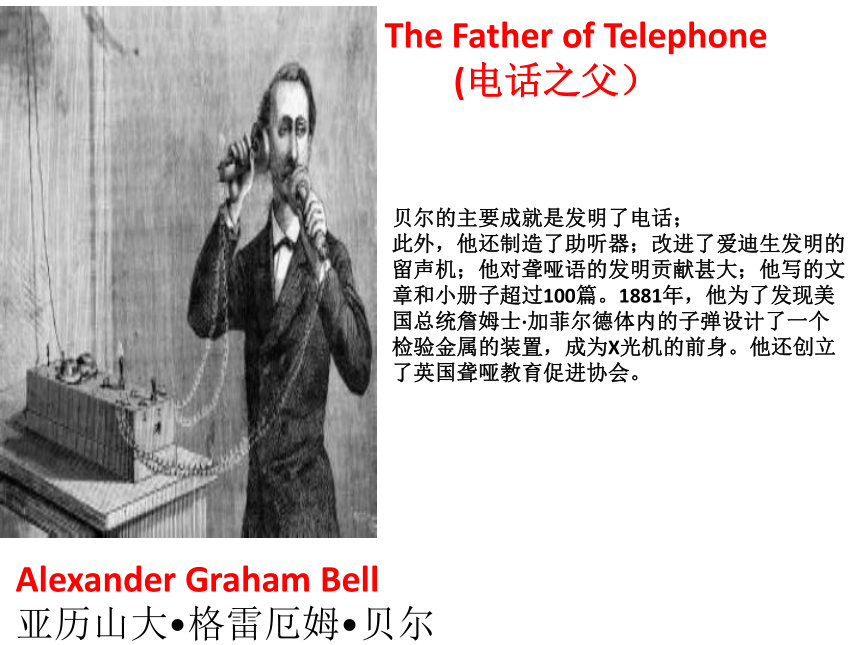
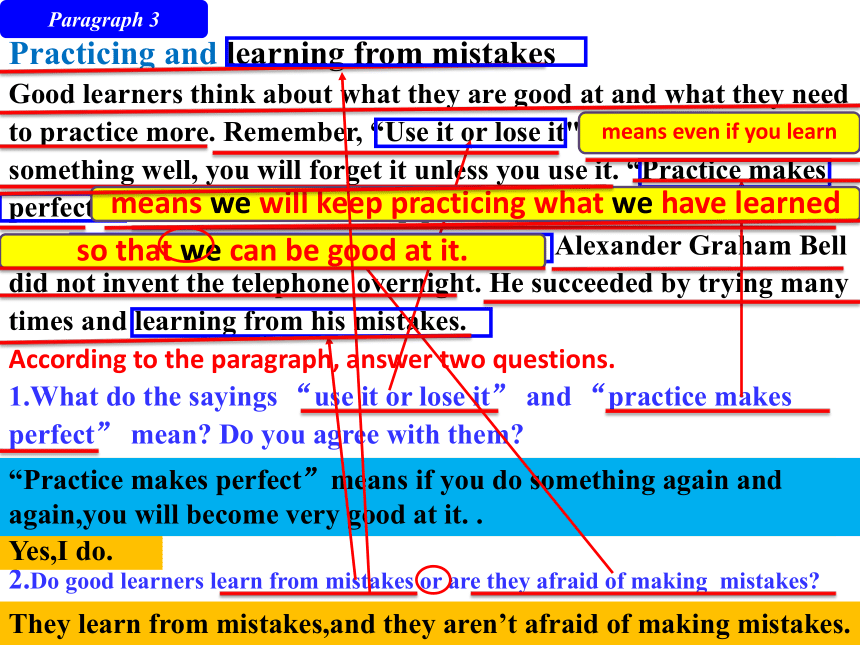
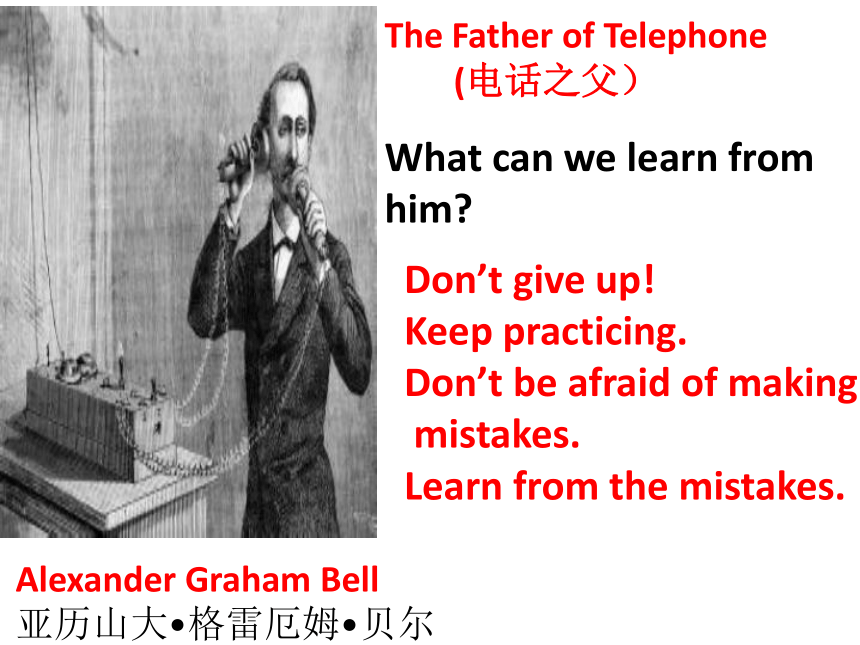
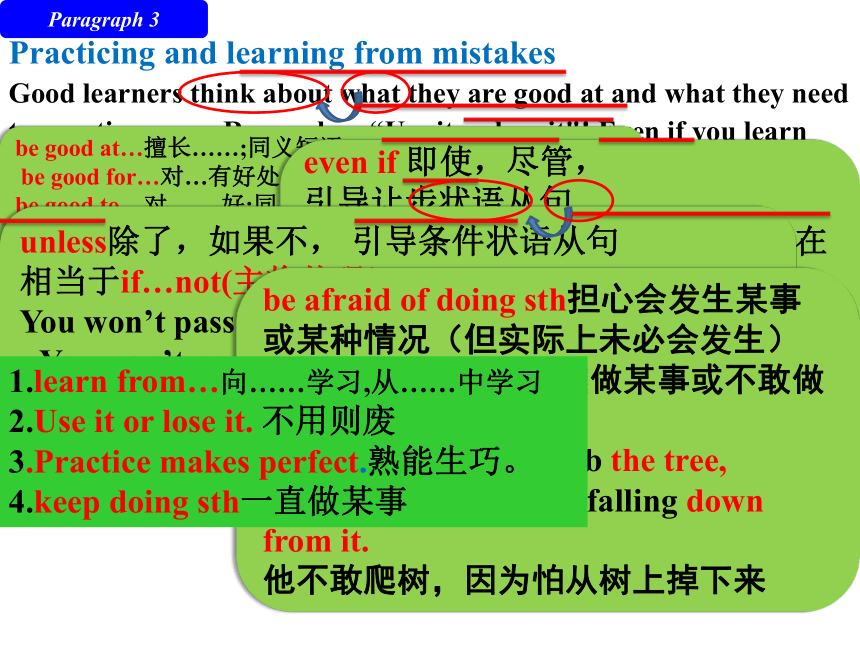
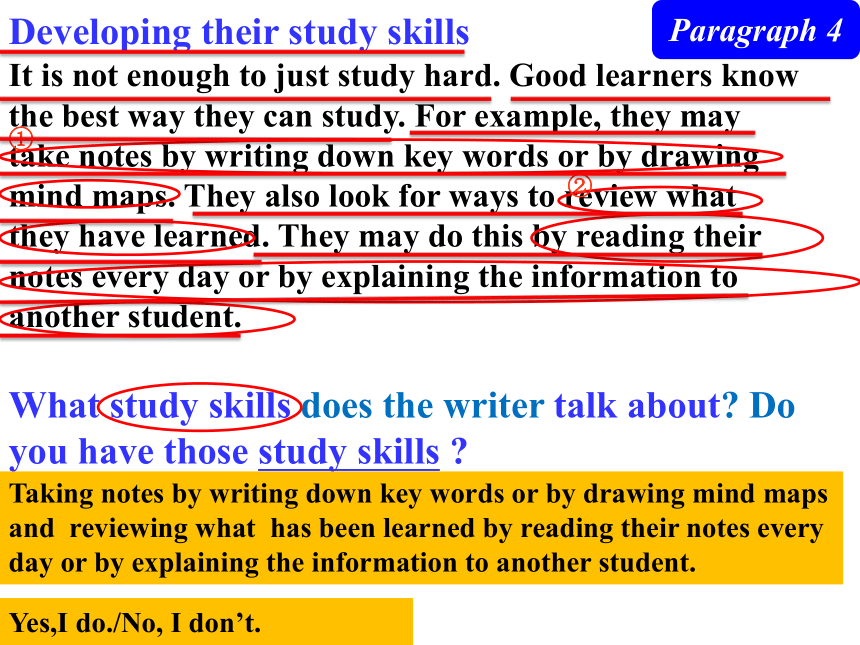
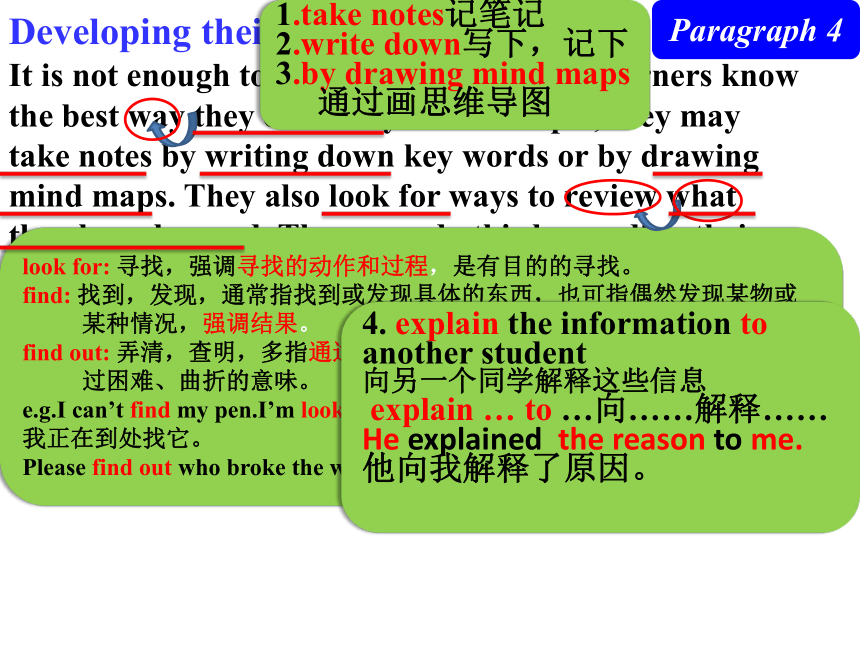
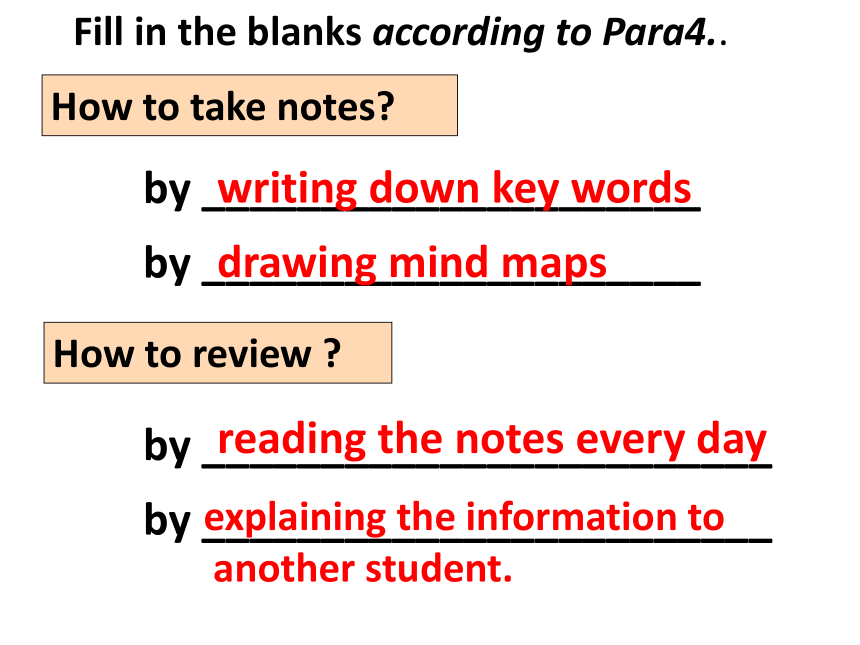
文档简介
课件23张PPT。Unit 4Section B(Period Three) How can we become good learners?Learning aimsTo Learn some phrases and language points.
To go on learning good habits of successful learners.
3. To be able to retell the passage
according to the mind map.
Alexander Graham Bell
亚历山大?格雷厄姆?贝尔What can we learn from
him?The Father of Telephone
(电话之父)贝尔的主要成就是发明了电话;
此外,他还制造了助听器;改进了爱迪生发明的留声机;他对聋哑语的发明贡献甚大;他写的文章和小册子超过100篇。1881年,他为了发现美国总统詹姆士·加菲尔德体内的子弹设计了一个检验金属的装置,成为X光机的前身。他还创立了英国聋哑教育促进协会。Practicing and learning from mistakes
Good learners think about what they are good at and what they need to practice more. Remember, “Use it or lose it"! Even if you learn something well, you will forget it unless you use it. “Practice makes perfect.” Good learners will keep practicing what they have learned and they are not afraid of making mistakes. Alexander Graham Bell did not invent the telephone overnight. He succeeded by trying many times and learning from his mistakes.
According to the paragraph, answer two questions.
1.What do the sayings “use it or lose it” and “practice makes perfect” mean? Do you agree with them?
2.Do good learners learn from mistakes or are they afraid of making mistakes?
. Paragraph 3“Use it or lose it”means if you stop doing something,you will forget how to do it.Yes,I do. They learn from mistakes,and they aren’t afraid of making mistakes.“Practice makes perfect”means if you do something again and again,you will become very good at it. .
means we will keep practicing what we have learned
means even if you learn
so that we can be good at it.
Alexander Graham Bell
亚历山大?格雷厄姆?贝尔What can we learn from him?The Father of Telephone
(电话之父)Don’t give up!
Keep practicing.
Don’t be afraid of making
mistakes.
Learn from the mistakes.Practicing and learning from mistakes
Good learners think about what they are good at and what they need to practice more. Remember, “Use it or lose it"! Even if you learn something well, you will forget it unless you use it. “Practice makes perfect.” Good learners will keep practicing what they have learned, and they are not afraid of making mistakes. Alexander Graham Bell did not invent the telephone overnight. He succeeded by trying many times and learning from his mistakes.
be good at…擅长……;同义短语 do well in..
be good for…对…有好处;反义短语 be bad for…
be good to…对…….好;同义短语be friendly/kind to...
be good with…和……相处的很好;同义短语get on well with.. even if 即使,尽管,
引导让步状语从句
相当于even though,不能与but用在同一个句子中。与although/though 引导的让步状语从句的用法类似。
e.g.We’ll go there even if it rains.即使下雨我们也要去那儿。unless除了,如果不, 引导条件状语从句
相当于if…not(主将从现)
You won’t pass the exam unless you work hard.
=You won’t pass the exam if you don’t work hard.
你如果不努力学习,你将不会通过考试。be afraid of doing sth担心会发生某事或某种情况(但实际上未必会发生)
be afraid to do sth害怕做某事或不敢做某事
e.g.He is afraid to climb the tree,
because he is afraid of falling down from it.
他不敢爬树,因为怕从树上掉下来. Paragraph 31.learn from…向……学习,从……中学习
2.Use it or lose it. 不用则废
3.Practice makes perfect.熟能生巧。
4.keep doing sth一直做某事 Developing their study skills
It is not enough to just study hard. Good learners know the best way they can study. For example, they may take notes by writing down key words or by drawing mind maps. They also look for ways to review what they have learned. They may do this by reading their notes every day or by explaining the information to another student.
What study skills does the writer talk about? Do you have those study skills ?
Paragraph 4Taking notes by writing down key words or by drawing mind maps and reviewing what has been learned by reading their notes every day or by explaining the information to another student.Yes,I do./No, I don’t. ①②Developing their study skills
It is not enough to just study hard. Good learners know the best way they can study. For example, they may take notes by writing down key words or by drawing mind maps. They also look for ways to review what they have learned. They may do this by reading their notes every day or by explaining the information to another student.
Paragraph 4look for: 寻找,强调寻找的动作和过程,是有目的的寻找。
find: 找到,发现,通常指找到或发现具体的东西,也可指偶然发现某物或
某种情况,强调结果。
find out: 弄清,查明,多指通过调查、询问、研究后搞清楚、弄明白,含经
过困难、曲折的意味。
e.g.I can’t find my pen.I’m looking for it everywhere.我找不到我的钢笔了,我正在到处找它。
Please find out who broke the window.请找出是谁打破了窗户
1.take notes记笔记
2.write down写下,记下
3.by drawing mind maps
通过画思维导图4. explain the information to
another student
向另一个同学解释这些信息
explain … to …向……解释……
He explained the reason to me.
他向我解释了原因。How to take notes?How to review ?by _____________________
by _____________________by ________________________
by ________________________writing down key wordsdrawing mind mapsreading the notes every dayexplaining the information to
another student.Fill in the blanks according to Para4.. Asking questions
Good learners often ask questions during or after class. They even ask each other and try to find out the answers.
Knowledge comes from questioning.
互相;彼此
one another知识来源于质疑。Paragraph 5Why should we ask questions ?Because knowledge comes from questioning.
question n.问题
v.质疑,质问;
The more you question, the more knowledge you will learn.
你提出的问题越多,你学到的知识就越多。
Learning is a lifelong journey
because every day brings something new. Everything that you learn becomes a part of
you and changes you, so learn wisely and learn well.终生的旅程……的
一部分Paragraph 6要明智地学习并且学好 According to the paragraph, answer a question.
1.Do you agree that learning is a lifelong journey?
Why or why not?
Learning is a lifelong journey
because every day brings something new. Everything that you learn becomes a part of
you and changes you, so learn wisely and learn well. According to the paragraph, answer a question.
1.Do you agree that learning is a lifelong journey?
Why or why not?Paragraph 6Yes,I do. Because every day brings something new. Common habits of successful learnersCreating an
_______ in
what they learnThey ____what they need to learn with something_____.
Practicing
and _____ mistakesUse it or ____it. Practice
makes ____.
They will keep _____ and
aren’t afraid of _______.Developing
their _____They take notes by _____key words or by_____ mind maps.
They review by _______ their notes every day or by __________ the information to another student.______ They often_____questions and try to ____________ the answers.
Knowledge comes from _____._______ is a lifelong
journey. let’s learn
wisely and learn___.interestconnectinterestnglearning fromloseperfectpracticingmaking mistakesstudy skillswriting downdrawingreadingexplainingAsking questionsaskfind outquestioningLearningwellRead the passage again and fill in the blanks.
2d. Write a sentence using the words in the box. brain n. connect v. overnight adv.
attention n. review v. knowledge n.
ability n. active adj. wisely adv.e.g. brain: A good way to train the brain is to do some math exercises every dayconnect: This railway connects Beijing with Shanghai.
overnight: He became famous overnight.
attention: We must pay attention to our writing.
review: I often review my English notes.
knowledge: We can learn knowledge from books.
ability: He has the ability to run fast.
active: She is active in the party.
wisely: Let’s learn wisely and learn well.2e Do you think you are a good learner? What learning habits do you think are useful? Discuss with your group and share your ideas with the class.share sth with sb与某人分享某物I think…/I feel…/I believe…
I thinkfinishing our homework on time is useful.listening carefully in class is useful. studying in groups and helping each other is useful.going over the lessons after class is useful.getting ready for our lessons before class is useful. doing more reading in our free time is useful.asking others for help is useful._____ What’s the matter?
_____ Well, I practice my listening by listening to the tape over and over again until I can understand everything.
_____ So you want to practice your listening?
_____ Hi, Jake. I need your help.
_____ Uh-huh. Do you have any advice?
_____ OK, I’ll try that.
_____ I have a listening test next week.2. Number these sentences in order to make a conversation.2641573over and over again
一遍又一遍,反复地have a listening test
有一个听力测试
Self CheckHave a try!一.用所给词的适当形式填空
__________(learn) is a lifelong journey.
2.I’ll keep ____________(practice) speaking English.
3. We should learn________(wise) and learn well.
4.I’m sure he has the ________(able) to do the job.
5.Your______________(pronounce) is very good.
6. We should take notes by_________( write) down key words
Learning
keep doing sth
practicingwiselyabilitypronunciationwriting
by doing sth
二.单项选择题
1.I won’t talk about that with Kate_________she wants.
A. because B.unless C.after
2.Jim is afraid________a bike, because he is afraid ______off the bike.
A.to ride,of falling B.of riding,to fall C. to ride,to fall
3.Read the passage, and_________the answer to the question.
A.find B.look for C. find out
4.Tom is always late for school_______he gets up early.
A.even if B.if C. as soon as
5. He is good _________English.
A. to B. at C.for D.with
B A C A B
be afraid to do sth害怕做某事或不敢做某事
be afraid of doing sth担心会发生某事或某种情况
中考直播间Homework1.Recite the phrases and language points .
2.Preview 3a and 3b.
3.Finish the first of Self Check by yourselves.
4.Try to write “How to be a good learner”according to 2e.4月22日笔记
1.learn from…向……学习,从……中学习
2.be good at…擅长……同义短语do well in..
be good for…对……有好处反义短语be bad for…对……有害
be good to…对…….好;同义短语be friendly/kind to...
be good with…和……相处的很好;同义短语get on well with..
3.Use it or lose it. 不用则废.
4.even if 即使,尽管,引导让步状语从句相当于even though,不能与but用在同一个句子中。与although/though 引导的让步状语从句的用法类似。
5.unless除了,如果不,引导条件状语从句 相当于if…not(主将从现)
You will fail the exam unless you work hard.
=You will fail the exam if you don’t work hard.你如果不努力学习,就会考试不及格。
6.Practice makes perfect.熟能生巧。
7.Learning is a lifelong journey学习是终生的旅程
8.learn wisely and learn well要明智地学习并且学好
9.share sth with sb与某人分享某物
10.be afraid of doing sth担心会发生某事或某种情况(但实际上未必会发生)be afraid to do sth害怕做某事或不敢去做某事
He is afraid to climb the tree,because he is afraid of falling down from it.他不敢爬树,因为怕从树上掉下来
11.take notes记笔记 12.write down写下,记下
13.by drawing mind maps通过画思维导图
14.explain … to…向……解释……
15.look for: 寻找,强调寻找的动作和过程,是有目的的寻找。
find: 找到,发现,通常指找到或发现具体的东西,也可指偶然发现某物或某种情况,强调结果。
find out: 弄清,查明,多指通过调查、询问、研究后搞清楚、弄明白,含经过困难、曲折的意味。
16.a part of ……的一部分
17.each other互相;彼此 one another
18.Knowledge comes from questioning.知识来源于质疑
19.培养学习技能develop study skills
20.over and over again一遍又一遍,反复地
21have a listening test有一个听力测试
Keep good learning habits!Free to ask others for help!
To go on learning good habits of successful learners.
3. To be able to retell the passage
according to the mind map.
Alexander Graham Bell
亚历山大?格雷厄姆?贝尔What can we learn from
him?The Father of Telephone
(电话之父)贝尔的主要成就是发明了电话;
此外,他还制造了助听器;改进了爱迪生发明的留声机;他对聋哑语的发明贡献甚大;他写的文章和小册子超过100篇。1881年,他为了发现美国总统詹姆士·加菲尔德体内的子弹设计了一个检验金属的装置,成为X光机的前身。他还创立了英国聋哑教育促进协会。Practicing and learning from mistakes
Good learners think about what they are good at and what they need to practice more. Remember, “Use it or lose it"! Even if you learn something well, you will forget it unless you use it. “Practice makes perfect.” Good learners will keep practicing what they have learned and they are not afraid of making mistakes. Alexander Graham Bell did not invent the telephone overnight. He succeeded by trying many times and learning from his mistakes.
According to the paragraph, answer two questions.
1.What do the sayings “use it or lose it” and “practice makes perfect” mean? Do you agree with them?
2.Do good learners learn from mistakes or are they afraid of making mistakes?
. Paragraph 3“Use it or lose it”means if you stop doing something,you will forget how to do it.Yes,I do. They learn from mistakes,and they aren’t afraid of making mistakes.“Practice makes perfect”means if you do something again and again,you will become very good at it. .
means we will keep practicing what we have learned
means even if you learn
so that we can be good at it.
Alexander Graham Bell
亚历山大?格雷厄姆?贝尔What can we learn from him?The Father of Telephone
(电话之父)Don’t give up!
Keep practicing.
Don’t be afraid of making
mistakes.
Learn from the mistakes.Practicing and learning from mistakes
Good learners think about what they are good at and what they need to practice more. Remember, “Use it or lose it"! Even if you learn something well, you will forget it unless you use it. “Practice makes perfect.” Good learners will keep practicing what they have learned, and they are not afraid of making mistakes. Alexander Graham Bell did not invent the telephone overnight. He succeeded by trying many times and learning from his mistakes.
be good at…擅长……;同义短语 do well in..
be good for…对…有好处;反义短语 be bad for…
be good to…对…….好;同义短语be friendly/kind to...
be good with…和……相处的很好;同义短语get on well with.. even if 即使,尽管,
引导让步状语从句
相当于even though,不能与but用在同一个句子中。与although/though 引导的让步状语从句的用法类似。
e.g.We’ll go there even if it rains.即使下雨我们也要去那儿。unless除了,如果不, 引导条件状语从句
相当于if…not(主将从现)
You won’t pass the exam unless you work hard.
=You won’t pass the exam if you don’t work hard.
你如果不努力学习,你将不会通过考试。be afraid of doing sth担心会发生某事或某种情况(但实际上未必会发生)
be afraid to do sth害怕做某事或不敢做某事
e.g.He is afraid to climb the tree,
because he is afraid of falling down from it.
他不敢爬树,因为怕从树上掉下来. Paragraph 31.learn from…向……学习,从……中学习
2.Use it or lose it. 不用则废
3.Practice makes perfect.熟能生巧。
4.keep doing sth一直做某事 Developing their study skills
It is not enough to just study hard. Good learners know the best way they can study. For example, they may take notes by writing down key words or by drawing mind maps. They also look for ways to review what they have learned. They may do this by reading their notes every day or by explaining the information to another student.
What study skills does the writer talk about? Do you have those study skills ?
Paragraph 4Taking notes by writing down key words or by drawing mind maps and reviewing what has been learned by reading their notes every day or by explaining the information to another student.Yes,I do./No, I don’t. ①②Developing their study skills
It is not enough to just study hard. Good learners know the best way they can study. For example, they may take notes by writing down key words or by drawing mind maps. They also look for ways to review what they have learned. They may do this by reading their notes every day or by explaining the information to another student.
Paragraph 4look for: 寻找,强调寻找的动作和过程,是有目的的寻找。
find: 找到,发现,通常指找到或发现具体的东西,也可指偶然发现某物或
某种情况,强调结果。
find out: 弄清,查明,多指通过调查、询问、研究后搞清楚、弄明白,含经
过困难、曲折的意味。
e.g.I can’t find my pen.I’m looking for it everywhere.我找不到我的钢笔了,我正在到处找它。
Please find out who broke the window.请找出是谁打破了窗户
1.take notes记笔记
2.write down写下,记下
3.by drawing mind maps
通过画思维导图4. explain the information to
another student
向另一个同学解释这些信息
explain … to …向……解释……
He explained the reason to me.
他向我解释了原因。How to take notes?How to review ?by _____________________
by _____________________by ________________________
by ________________________writing down key wordsdrawing mind mapsreading the notes every dayexplaining the information to
another student.Fill in the blanks according to Para4.. Asking questions
Good learners often ask questions during or after class. They even ask each other and try to find out the answers.
Knowledge comes from questioning.
互相;彼此
one another知识来源于质疑。Paragraph 5Why should we ask questions ?Because knowledge comes from questioning.
question n.问题
v.质疑,质问;
The more you question, the more knowledge you will learn.
你提出的问题越多,你学到的知识就越多。
Learning is a lifelong journey
because every day brings something new. Everything that you learn becomes a part of
you and changes you, so learn wisely and learn well.终生的旅程……的
一部分Paragraph 6要明智地学习并且学好 According to the paragraph, answer a question.
1.Do you agree that learning is a lifelong journey?
Why or why not?
Learning is a lifelong journey
because every day brings something new. Everything that you learn becomes a part of
you and changes you, so learn wisely and learn well. According to the paragraph, answer a question.
1.Do you agree that learning is a lifelong journey?
Why or why not?Paragraph 6Yes,I do. Because every day brings something new. Common habits of successful learnersCreating an
_______ in
what they learnThey ____what they need to learn with something_____.
Practicing
and _____ mistakesUse it or ____it. Practice
makes ____.
They will keep _____ and
aren’t afraid of _______.Developing
their _____They take notes by _____key words or by_____ mind maps.
They review by _______ their notes every day or by __________ the information to another student.______ They often_____questions and try to ____________ the answers.
Knowledge comes from _____._______ is a lifelong
journey. let’s learn
wisely and learn___.interestconnectinterestnglearning fromloseperfectpracticingmaking mistakesstudy skillswriting downdrawingreadingexplainingAsking questionsaskfind outquestioningLearningwellRead the passage again and fill in the blanks.
2d. Write a sentence using the words in the box. brain n. connect v. overnight adv.
attention n. review v. knowledge n.
ability n. active adj. wisely adv.e.g. brain: A good way to train the brain is to do some math exercises every dayconnect: This railway connects Beijing with Shanghai.
overnight: He became famous overnight.
attention: We must pay attention to our writing.
review: I often review my English notes.
knowledge: We can learn knowledge from books.
ability: He has the ability to run fast.
active: She is active in the party.
wisely: Let’s learn wisely and learn well.2e Do you think you are a good learner? What learning habits do you think are useful? Discuss with your group and share your ideas with the class.share sth with sb与某人分享某物I think…/I feel…/I believe…
I thinkfinishing our homework on time is useful.listening carefully in class is useful. studying in groups and helping each other is useful.going over the lessons after class is useful.getting ready for our lessons before class is useful. doing more reading in our free time is useful.asking others for help is useful._____ What’s the matter?
_____ Well, I practice my listening by listening to the tape over and over again until I can understand everything.
_____ So you want to practice your listening?
_____ Hi, Jake. I need your help.
_____ Uh-huh. Do you have any advice?
_____ OK, I’ll try that.
_____ I have a listening test next week.2. Number these sentences in order to make a conversation.2641573over and over again
一遍又一遍,反复地have a listening test
有一个听力测试
Self CheckHave a try!一.用所给词的适当形式填空
__________(learn) is a lifelong journey.
2.I’ll keep ____________(practice) speaking English.
3. We should learn________(wise) and learn well.
4.I’m sure he has the ________(able) to do the job.
5.Your______________(pronounce) is very good.
6. We should take notes by_________( write) down key words
Learning
keep doing sth
practicingwiselyabilitypronunciationwriting
by doing sth
二.单项选择题
1.I won’t talk about that with Kate_________she wants.
A. because B.unless C.after
2.Jim is afraid________a bike, because he is afraid ______off the bike.
A.to ride,of falling B.of riding,to fall C. to ride,to fall
3.Read the passage, and_________the answer to the question.
A.find B.look for C. find out
4.Tom is always late for school_______he gets up early.
A.even if B.if C. as soon as
5. He is good _________English.
A. to B. at C.for D.with
B A C A B
be afraid to do sth害怕做某事或不敢做某事
be afraid of doing sth担心会发生某事或某种情况
中考直播间Homework1.Recite the phrases and language points .
2.Preview 3a and 3b.
3.Finish the first of Self Check by yourselves.
4.Try to write “How to be a good learner”according to 2e.4月22日笔记
1.learn from…向……学习,从……中学习
2.be good at…擅长……同义短语do well in..
be good for…对……有好处反义短语be bad for…对……有害
be good to…对…….好;同义短语be friendly/kind to...
be good with…和……相处的很好;同义短语get on well with..
3.Use it or lose it. 不用则废.
4.even if 即使,尽管,引导让步状语从句相当于even though,不能与but用在同一个句子中。与although/though 引导的让步状语从句的用法类似。
5.unless除了,如果不,引导条件状语从句 相当于if…not(主将从现)
You will fail the exam unless you work hard.
=You will fail the exam if you don’t work hard.你如果不努力学习,就会考试不及格。
6.Practice makes perfect.熟能生巧。
7.Learning is a lifelong journey学习是终生的旅程
8.learn wisely and learn well要明智地学习并且学好
9.share sth with sb与某人分享某物
10.be afraid of doing sth担心会发生某事或某种情况(但实际上未必会发生)be afraid to do sth害怕做某事或不敢去做某事
He is afraid to climb the tree,because he is afraid of falling down from it.他不敢爬树,因为怕从树上掉下来
11.take notes记笔记 12.write down写下,记下
13.by drawing mind maps通过画思维导图
14.explain … to…向……解释……
15.look for: 寻找,强调寻找的动作和过程,是有目的的寻找。
find: 找到,发现,通常指找到或发现具体的东西,也可指偶然发现某物或某种情况,强调结果。
find out: 弄清,查明,多指通过调查、询问、研究后搞清楚、弄明白,含经过困难、曲折的意味。
16.a part of ……的一部分
17.each other互相;彼此 one another
18.Knowledge comes from questioning.知识来源于质疑
19.培养学习技能develop study skills
20.over and over again一遍又一遍,反复地
21have a listening test有一个听力测试
Keep good learning habits!Free to ask others for help!
同课章节目录
- Unit 1 When was heborn?
- Section A
- Section B
- Unit 2 It's a nice day, isn't it?
- Section A
- Section B
- Unit 3 Where would you like to visit?
- Section A
- Section B
- Unit 4 How can we become good learners?
- Section A
- Section B
- Unit 5 I think that mooncakes are delicious!
- Section A
- Section B
- Unit 6 Could you please tell me where the restroom
- Section A
- Section B
- Unit 7 I used to be afraid of the dark.
- Section A
- Section B
- Unit 8 What are the shirts made of?
- Section A
- Section B
